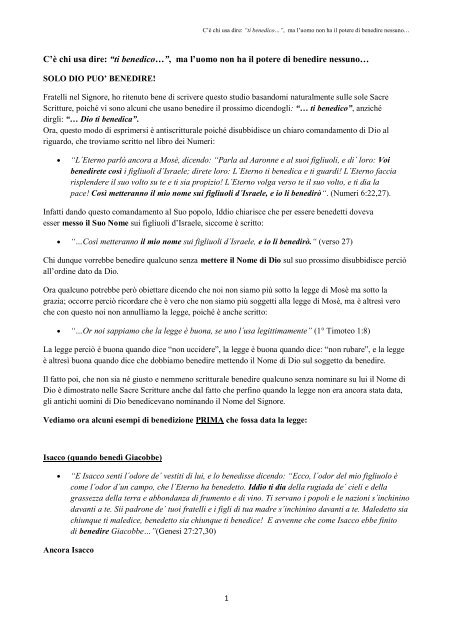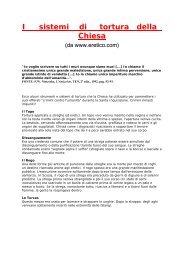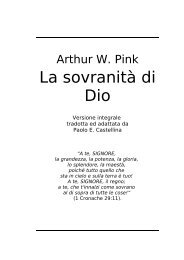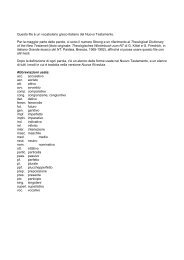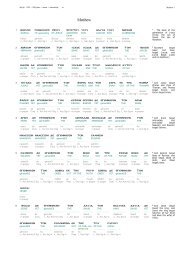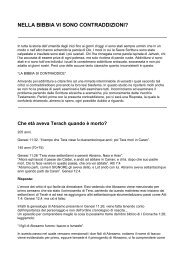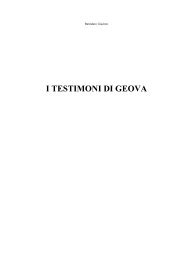C'è chi usa dire: “ti benedico…”, ma l'uomo non ha il potere di ...
C'è chi usa dire: “ti benedico…”, ma l'uomo non ha il potere di ...
C'è chi usa dire: “ti benedico…”, ma l'uomo non ha il potere di ...
Create successful ePaper yourself
Turn your PDF publications into a flip-book with our unique Google optimized e-Paper software.
C’è <strong>chi</strong> <strong>usa</strong> <strong><strong>di</strong>re</strong>: <strong>“ti</strong> <strong>bene<strong>di</strong>co…”</strong>, <strong>ma</strong> l’uomo <strong>non</strong> <strong>ha</strong> <strong>il</strong> <strong>potere</strong> <strong>di</strong> bene<strong><strong>di</strong>re</strong> nessuno…<br />
C’è <strong>chi</strong> <strong>usa</strong> <strong><strong>di</strong>re</strong>: <strong>“ti</strong> <strong>bene<strong>di</strong>co…”</strong>, <strong>ma</strong> l’uomo <strong>non</strong> <strong>ha</strong> <strong>il</strong> <strong>potere</strong> <strong>di</strong> bene<strong><strong>di</strong>re</strong> nessuno…<br />
SOLO DIO PUO’ BENEDIRE!<br />
Fratelli nel Signore, ho ritenuto bene <strong>di</strong> scrivere questo stu<strong>di</strong>o basandomi naturalmente sulle sole Sacre<br />
Scritture, poiché vi sono alcuni che <strong>usa</strong>no bene<strong><strong>di</strong>re</strong> <strong>il</strong> prossimo <strong>di</strong>cendogli: “… ti bene<strong>di</strong>co”, anziché<br />
<strong>di</strong>rgli: “… Dio ti bene<strong>di</strong>ca”.<br />
Ora, questo modo <strong>di</strong> esprimersi è antiscritturale poiché <strong>di</strong>subbi<strong>di</strong>sce un <strong>chi</strong>aro co<strong>ma</strong>ndamento <strong>di</strong> Dio al<br />
riguardo, che troviamo scritto nel libro dei Numeri:<br />
“L´Eterno parlò ancora a Mosè, <strong>di</strong>cendo: “Parla ad Aaronne e al suoi figliuoli, e <strong>di</strong>´ loro: Voi<br />
bene<strong><strong>di</strong>re</strong>te così i figliuoli d´Israele; <strong><strong>di</strong>re</strong>te loro: L´Eterno ti bene<strong>di</strong>ca e ti guar<strong>di</strong>! L´Eterno faccia<br />
risplendere <strong>il</strong> suo volto su te e ti sia propizio! L´Eterno volga verso te <strong>il</strong> suo volto, e ti <strong>di</strong>a la<br />
pace! Così metteranno <strong>il</strong> mio nome sui figliuoli d´Israele, e io li bene<strong>di</strong>rò“. (Numeri 6:22,27).<br />
Infatti dando questo co<strong>ma</strong>ndamento al Suo popolo, Id<strong>di</strong>o <strong>chi</strong>arisce che per essere benedetti doveva<br />
esser messo <strong>il</strong> Suo Nome sui figliuoli d’Israele, siccome è scritto:<br />
“…Così metteranno <strong>il</strong> mio nome sui figliuoli d´Israele, e io li bene<strong>di</strong>rò.“ (verso 27)<br />
Chi dunque vorrebbe bene<strong><strong>di</strong>re</strong> qualcuno senza mettere <strong>il</strong> Nome <strong>di</strong> Dio sul suo prossimo <strong>di</strong>subbi<strong>di</strong>sce perciò<br />
all’or<strong>di</strong>ne dato da Dio.<br />
Ora qualcuno potrebbe però obiettare <strong>di</strong>cendo che noi <strong>non</strong> siamo più sotto la legge <strong>di</strong> Mosè <strong>ma</strong> sotto la<br />
grazia; occorre perciò ricordare che è vero che <strong>non</strong> siamo più soggetti alla legge <strong>di</strong> Mosè, <strong>ma</strong> è altresì vero<br />
che con questo noi <strong>non</strong> annulliamo la legge, poiché è anche scritto:<br />
“…Or noi sappiamo che la legge è buona, se uno l´<strong>usa</strong> legitti<strong>ma</strong>mente” (1° Timoteo 1:8)<br />
La legge perciò è buona quando <strong>di</strong>ce “<strong>non</strong> uccidere”, la legge è buona quando <strong>di</strong>ce: “<strong>non</strong> rubare”, e la legge<br />
è altresì buona quando <strong>di</strong>ce che dobbiamo bene<strong><strong>di</strong>re</strong> mettendo <strong>il</strong> Nome <strong>di</strong> Dio sul soggetto da bene<strong><strong>di</strong>re</strong>.<br />
Il fatto poi, che <strong>non</strong> sia né giusto e nemmeno scritturale bene<strong><strong>di</strong>re</strong> qualcuno senza nominare su lui <strong>il</strong> Nome <strong>di</strong><br />
Dio è <strong>di</strong>mostrato nelle Sacre Scritture anche dal fatto che perfino quando la legge <strong>non</strong> era ancora stata data,<br />
gli anti<strong>chi</strong> uomini <strong>di</strong> Dio bene<strong>di</strong>cevano nominando <strong>il</strong> Nome del Signore.<br />
Ve<strong>di</strong>amo ora alcuni esempi <strong>di</strong> bene<strong>di</strong>zione PRIMA che fossa data la legge:<br />
Isacco (quando benedì Giacobbe)<br />
“E Isacco senti l´odore de´ vestiti <strong>di</strong> lui, e lo bene<strong>di</strong>sse <strong>di</strong>cendo: “Ecco, l´odor del mio figliuolo è<br />
come l´odor d´un campo, che l´Eterno <strong>ha</strong> benedetto. Id<strong>di</strong>o ti <strong>di</strong>a della rugiada de´ cieli e della<br />
grassezza della terra e abbondanza <strong>di</strong> frumento e <strong>di</strong> vino. Ti servano i popoli e le nazioni s´in<strong>chi</strong>nino<br />
davanti a te. Sii padrone de´ tuoi fratelli e i figli <strong>di</strong> tua <strong>ma</strong>dre s´in<strong>chi</strong>nino davanti a te. Maledetto sia<br />
<strong>chi</strong>unque ti <strong>ma</strong>le<strong>di</strong>ce, benedetto sia <strong>chi</strong>unque ti bene<strong>di</strong>ce! E avvenne che come Isacco ebbe finito<br />
<strong>di</strong> bene<strong><strong>di</strong>re</strong> Giacobbe…”(Genesi 27:27,30)<br />
Ancora Isacco<br />
1
C’è <strong>chi</strong> <strong>usa</strong> <strong><strong>di</strong>re</strong>: <strong>“ti</strong> <strong>bene<strong>di</strong>co…”</strong>, <strong>ma</strong> l’uomo <strong>non</strong> <strong>ha</strong> <strong>il</strong> <strong>potere</strong> <strong>di</strong> bene<strong><strong>di</strong>re</strong> nessuno…<br />
“Allora Isacco <strong>chi</strong>amò Giacobbe, lo bene<strong>di</strong>sse e gli <strong>di</strong>ede quest´or<strong>di</strong>ne: “Non prender moglie tra le<br />
figliuole <strong>di</strong> Canaan. Lèvati, vattene in Paddan-Aram, alla casa <strong>di</strong> Bethuel, padre <strong>di</strong> tua <strong>ma</strong>dre, e<br />
pren<strong>di</strong>ti moglie <strong>di</strong> là, tra le figliuole <strong>di</strong> Labano, fratello <strong>di</strong> tua <strong>ma</strong>dre…” (Genesi 28:1,2)<br />
…e come lo bene<strong>di</strong>sse?<br />
“… E l´Id<strong>di</strong>o onnipotente ti bene<strong>di</strong>ca, ti renda fecondo e ti moltipli<strong>chi</strong>, in guisa che tu <strong>di</strong>venti<br />
un´assemblea <strong>di</strong> popoli, e ti <strong>di</strong>a la bene<strong>di</strong>zione d´Abra<strong>ha</strong>mo: a te, e alla tua progenie con te;<br />
affinché tu possegga <strong>il</strong> paese dove sei andato peregrinando, e che Dio donò ad Abra<strong>ha</strong>mo”. (Genesi<br />
28:3,4)<br />
Sarebbe perciò errato <strong>non</strong> leggere i versi precedenti dove Isacco nomina <strong>il</strong> Nome <strong>di</strong> Dio e prendere<br />
solo <strong>il</strong> seguente verso 33, cioè <strong>di</strong> quando arrivò Esau a cui Isacco pur scoprendo l’inganno <strong>di</strong>sse:<br />
“…e l´ho benedetto; e benedetto ei sarà” (Genesi 27:33)<br />
Giacobbe (quando benedì Giuseppe e i suoi figli)<br />
“E Israele (Giacobbe) stese la sua <strong>ma</strong>n destra, e la posò sul capo <strong>di</strong> Efraim ch´era <strong>il</strong> più giovane; e<br />
posò la sua <strong>ma</strong>no sinistra sul capo <strong>di</strong> Manasse, incrociando le <strong>ma</strong>ni; poiché Manasse era <strong>il</strong><br />
primogenito. E bene<strong>di</strong>sse Giuseppe, e <strong>di</strong>sse: “L´Id<strong>di</strong>o, nel cui cospetto camminarono i miei padri<br />
Abra<strong>ha</strong>mo e Isacco, l´Id<strong>di</strong>o ch´è stato <strong>il</strong> mio pastore dacché esisto fino a questo giorno, l´angelo che<br />
mi <strong>ha</strong> liberato da ogni <strong>ma</strong>le, bene<strong>di</strong>ca questi fanciulli!” (Genesi:48:14,15) - “E in quel giorno li<br />
bene<strong>di</strong>sse…” (Genesi 48:20)<br />
Come per l’esempio <strong>di</strong> Isacco, anche in questo caso occorre far notare che vi sono <strong>di</strong>versi versi nella Bibbia<br />
che presi da soli parrebbero avvalorare la pratica <strong>di</strong> <strong><strong>di</strong>re</strong>: <strong>“ti</strong> <strong>bene<strong>di</strong>co…”</strong>, al suo prossimo. Ad esempio<br />
sarebbe sbagliato prendere solo <strong>il</strong> verso 20 del capitolo 48 <strong>di</strong> Genesi che <strong>di</strong>ce: “E in quel giorno li<br />
bene<strong>di</strong>sse…” (Genesi 48:20), senza citare i versi precedenti che <strong>di</strong>mostrano <strong>chi</strong>aramente che Giacobbe<br />
bene<strong>di</strong>sse i figli <strong>di</strong> Giuseppe <strong>non</strong> <strong>di</strong> suo, <strong>ma</strong> nominando su <strong>di</strong> loro <strong>il</strong> nome <strong>di</strong> Dio, quando <strong>di</strong>sse: “L´Id<strong>di</strong>o,<br />
nel cui cospetto…bene<strong>di</strong>ca questi fanciulli!” (Genesi 48:15). Più avanti ad esempio, vedremo un verso al tal<br />
riguardo inerente Mosè.<br />
Per questo motivo i <strong>di</strong>subbi<strong>di</strong>enti intoppano (o inciampano), nella Parola.<br />
Perciò riguardo <strong>il</strong> co<strong>ma</strong>ndamento (o la legge) sul modo in cui Israele doveva bene<strong><strong>di</strong>re</strong> <strong>il</strong> prossimo, dato da<br />
Dio a Mosè in Numeri 6:22,27, sia Isacco che Giacobbe mostrarono che quella stessa legge, l’avevan<br />
ambedue scritta nel loro cuore quando bene<strong>di</strong>cevano nominando <strong>il</strong> Nome <strong>di</strong> Dio, anche pri<strong>ma</strong> che la legge<br />
fosse data agli uomini.<br />
Ve<strong>di</strong>amo adesso altri esempi biblici su come nell’anti<strong>chi</strong>tà si bene<strong>di</strong>va <strong>il</strong> prossimo DOPO che fu data la<br />
legge:<br />
Mòse<br />
“Queste sono le parole che Mosè rivolse a Israele… L´Eterno, l´Id<strong>di</strong>o de´vostri padrivi aumenti<br />
anche m<strong>il</strong>le volte <strong>di</strong> più, e vi bene<strong>di</strong>ca come vi <strong>ha</strong> promesso <strong>di</strong> fare!”(Deuteronomio 1:1,11)<br />
2
Naomi (a Rut)<br />
Saul<br />
Davide<br />
“Ed egli a lei: “Sii benedetta dall´Eterno, figliuola mia!” (Rut 3:10)<br />
C’è <strong>chi</strong> <strong>usa</strong> <strong><strong>di</strong>re</strong>: <strong>“ti</strong> <strong>bene<strong>di</strong>co…”</strong>, <strong>ma</strong> l’uomo <strong>non</strong> <strong>ha</strong> <strong>il</strong> <strong>potere</strong> <strong>di</strong> bene<strong><strong>di</strong>re</strong> nessuno…<br />
“Saul <strong>di</strong>sse: “Siate benedetti dall´Eterno, voi che avete pietà <strong>di</strong> me!” (1° Samuele 23:21)<br />
“Allora Davide inviò de´ messi agli uomini <strong>di</strong> Jabes <strong>di</strong> Galaad, e fece <strong>di</strong>r loro: “Siate benedetti<br />
dall´Eterno, voi che avete mostrato questa benignità verso Saul, vostro signore, dandogli<br />
sepoltura!” (2° Samuele 2:5)<br />
Passi biblici possib<strong>il</strong>e ca<strong>usa</strong> d’inciampo per i <strong>di</strong>subbi<strong>di</strong>enti<br />
“…essi, infatti, essendo <strong>di</strong>subbi<strong>di</strong>enti, intoppano nella Parola; ed a questo sono stati anche<br />
destinati.” (1° Pietro 2:8)<br />
Ci sono nella Parola <strong>di</strong> Dio anche altri versi, in cui sembrerebbe plausib<strong>il</strong>e bene<strong><strong>di</strong>re</strong> senza nominare <strong>il</strong><br />
nome <strong>di</strong> Dio, <strong>ma</strong> come vedremo <strong>non</strong> è così, perciò <strong>di</strong>ventano una ca<strong>usa</strong> d’inciampo per i <strong>di</strong>subbi<strong>di</strong>enti.<br />
Analizziamoli meglio:<br />
Elisabetta<br />
“E avvenne che come Elisabetta ebbe u<strong>di</strong>to <strong>il</strong> saluto <strong>di</strong> Maria, <strong>il</strong> bambino le balzò nel seno; ed<br />
Elisabetta fu ripiena <strong>di</strong> Spirito Santo, e a gran voce esclamò: Benedetta sei tu fra le donne, e<br />
benedetto è <strong>il</strong> frutto del tuo seno!” (Luca 1:41,42)<br />
E’ vero che leggiamo che Elisabetta, ripiena <strong>di</strong> Spirito Santo <strong>di</strong>sse così a Maria: “… Benedetta sei tu fra le<br />
donne, e benedetto è <strong>il</strong> frutto del tuo seno! “ (Luca 1:41,42) Ma <strong><strong>di</strong>re</strong> “Benedetta sei tu tra le donne” è<br />
<strong>di</strong>verso dal <strong><strong>di</strong>re</strong>: “Ti <strong>bene<strong>di</strong>co…”</strong>. E’ <strong>chi</strong>aro che Elisabetta <strong>di</strong>ce a Maria <strong>di</strong> essere benedetta… da<br />
“Qualcun’Altro…”.<br />
Da <strong>chi</strong> secondo voi?<br />
Debora<br />
“In quel giorno, Debora cantò questo cantico con Barak, figliuolo <strong>di</strong> Abinoam: …Benedetta sia fra<br />
le donne Jael, moglie <strong>di</strong> Heber, <strong>il</strong> Keneo! Fra le donne che stan sotto le tende, sia ella benedetta!”<br />
(Giu<strong>di</strong>ci 5:1,24)<br />
La stessa cosa si può <strong><strong>di</strong>re</strong> del cantico <strong>di</strong> Debora…<br />
E’ <strong>chi</strong>aro che quando Debora <strong>di</strong>ce: “Benedetta sia fra le donne Jael,… Sia ella benedetta”,<br />
quel “…Sia” vuol <strong>chi</strong>aramente <strong><strong>di</strong>re</strong> “sia benedetta da Qualcuno”, e quel “Qualcuno” <strong>chi</strong> potrà <strong>ma</strong>i essere, se<br />
<strong>non</strong> Dio?<br />
Davide<br />
3
C’è <strong>chi</strong> <strong>usa</strong> <strong><strong>di</strong>re</strong>: <strong>“ti</strong> <strong>bene<strong>di</strong>co…”</strong>, <strong>ma</strong> l’uomo <strong>non</strong> <strong>ha</strong> <strong>il</strong> <strong>potere</strong> <strong>di</strong> bene<strong><strong>di</strong>re</strong> nessuno…<br />
“E Davide <strong>di</strong>sse ad Abiga<strong>il</strong>: “Sia benedetto l´Eterno, l´Id<strong>di</strong>o d´Israele, che t´<strong>ha</strong> oggi <strong>ma</strong>ndata<br />
incontro a me! E sia benedetto <strong>il</strong> tuo senno, e benedetta sii tu che m´<strong>ha</strong>i oggi impe<strong>di</strong>to <strong>di</strong> spargere<br />
del sangue e <strong>di</strong> farmi giustizia con le mie proprie <strong>ma</strong>ni!” (1° Samuele 25:32,33)<br />
Anche qui ve<strong>di</strong>amo che Davide bene<strong>di</strong>ce Abiga<strong>il</strong> <strong>di</strong>cendogli: “…benedetta sii tu”. Notato <strong>il</strong> modo in cui<br />
Davide la bene<strong>di</strong>ce? “…sii tu”. Anche qui, “…sii tu” da <strong>chi</strong>? Se <strong>non</strong> da Dio? Lo stesso perciò si può <strong><strong>di</strong>re</strong> per<br />
altri passi sim<strong>il</strong>i come 1° Samuele 23:25 ecc…<br />
Mosè<br />
“E Mosè vide tutto <strong>il</strong> lavoro; ed ecco, essi l´aveano eseguito come l´Eterno aveva or<strong>di</strong>nato; l´aveano<br />
eseguito a quel modo… E Mosè li bene<strong>di</strong>sse.” (Esodo 39:43)<br />
Questo passo isolato potrebbe avvalorare l’ipotesi che Mosè li bene<strong>di</strong>sse senza menzionare <strong>il</strong> nome <strong>di</strong> Dio, se<br />
<strong>non</strong> fosse che come abbiamo letto pri<strong>ma</strong>, in Deuteronomio 1:11, lui invece, era solito bene<strong><strong>di</strong>re</strong> nominando <strong>il</strong><br />
Nome <strong>di</strong> Dio.<br />
Passi Biblici molto conosciuti…<br />
Ora desidero elencare una serie <strong>di</strong> versi dove ci vien or<strong>di</strong>nato <strong>di</strong> bene<strong><strong>di</strong>re</strong> i nostri nemici anziché <strong>ma</strong>le<strong>di</strong>rli;<br />
va però fatto notare che qui <strong>non</strong> è menzionata alcuna modalità sul “come” o sulla “formula” del bene<strong><strong>di</strong>re</strong>,<br />
poichè è sottinteso che dobbiamo bene<strong><strong>di</strong>re</strong> nel Nome del Signore…<br />
“Ma a voi che ascoltate, io <strong>di</strong>co: A<strong>ma</strong>te i vostri nemici; fate del bene a quelli che v´o<strong>di</strong>ano; bene<strong>di</strong>te<br />
quelli che vi <strong>ma</strong>le<strong>di</strong>cono, pregate per quelli che v´oltraggiano.”(Luca 6:27,28)<br />
“Bene<strong>di</strong>te quelli che vi perseguitano; bene<strong>di</strong>te e <strong>non</strong> <strong>ma</strong>le<strong>di</strong>te.” (Ro<strong>ma</strong>ni 12:14).<br />
“… ingiuriati, bene<strong>di</strong>ciamo; perseguitati, sopportiamo; <strong>di</strong>ffa<strong>ma</strong>ti, esortiamo.” (1° Corinzi 4:12)<br />
“… Infine, siate tutti concor<strong>di</strong>, compassionevoli, pieni d´amor fraterno, pietosi, um<strong>il</strong>i; <strong>non</strong> rendendo<br />
<strong>ma</strong>le per <strong>ma</strong>le, od oltraggio per oltraggio, <strong>ma</strong>, al contrario, bene<strong>di</strong>cendo; poiché a questo siete stati<br />
<strong>chi</strong>a<strong>ma</strong>ti onde ere<strong>di</strong>tiate la bene<strong>di</strong>zione.” (1° Pietro 3:8,9)<br />
Un approfon<strong>di</strong>mento sulla questione…<br />
Perché ho detto che in questi passi <strong>non</strong> è contenuta alcuna “formula” sul come bene<strong><strong>di</strong>re</strong>? Perché in quei<br />
passi l’accento è sull’atto in sé, che riguarda <strong>il</strong> nostro <strong>non</strong> rendere <strong>ma</strong>i <strong>ma</strong>le per <strong>ma</strong>le a nessuno, <strong>non</strong><br />
la “modalità” sul come bene<strong><strong>di</strong>re</strong>.<br />
Infatti lo stesso <strong>di</strong>scorso vale per tutti quei versi, ad esempio, in cui vien detto che i <strong>di</strong>scepoli<br />
battezzavano “…nel nome <strong>di</strong> Gesù” (Atti 8:16; 10:48; 19:5), dove lo scrittore descrive alcuni eventi… <strong>ma</strong><br />
<strong>non</strong> la formula battesi<strong>ma</strong>le! Poiché la vera formula battesi<strong>ma</strong>le la troviamo indubbiamente scritta nel<br />
vangelo <strong>di</strong> Matteo secondo <strong>il</strong> <strong>chi</strong>aro co<strong>ma</strong>ndamento <strong>di</strong> Gesù: “Andate dunque, am<strong>ma</strong>estrate tutti i<br />
popoli, battezzandoli nel nome del Padre e del Figliuolo e dello Spirito Santo, insegnando loro d´osservar<br />
tutte quante le cose che v´ho co<strong>ma</strong>ndate.” (Matteo 28:19,20)<br />
Numeri 6:22,27 in<strong>di</strong>ca perciò nella legge, <strong>il</strong> co<strong>ma</strong>ndamento su cui basare <strong>il</strong> principio della bene<strong>di</strong>zione da<br />
parte <strong>di</strong> Dio, per cui senza <strong>di</strong> Lui, <strong>non</strong> può esservi alcuna bene<strong>di</strong>zione…<br />
4
C’è <strong>chi</strong> <strong>usa</strong> <strong><strong>di</strong>re</strong>: <strong>“ti</strong> <strong>bene<strong>di</strong>co…”</strong>, <strong>ma</strong> l’uomo <strong>non</strong> <strong>ha</strong> <strong>il</strong> <strong>potere</strong> <strong>di</strong> bene<strong><strong>di</strong>re</strong> nessuno…<br />
Nei molti esempi <strong>di</strong> come anticamente si bene<strong>di</strong>va <strong>il</strong> prossimo abbiamo visto ad esempio Davide <strong><strong>di</strong>re</strong> ai<br />
messi <strong>di</strong> Jabes <strong>di</strong> Galad: “Siate benedetti dall’Eterno” (2° Samuele 2:5) anziché: “L’Eterno vi<br />
bene<strong>di</strong>ca…”, perciò è naturale che <strong><strong>di</strong>re</strong>: “Dio ti bene<strong>di</strong>ca…” oppure: “Il Signore ti bene<strong>di</strong>ca…”, oppure<br />
oggi che ci troviamo nel nuovo patto:“Gesù ti bene<strong>di</strong>ca…” o altre formule sim<strong>il</strong>i, è lo stesso che<br />
<strong><strong>di</strong>re</strong>: “L’Eterno… ti bene<strong>di</strong>ca”, descritto in Numeri 6:22,27, poichè è lo Spirito della legge, <strong>non</strong> la<br />
“for<strong>ma</strong>”, quello che conta.<br />
Quin<strong>di</strong> è perfettamente lecito bene<strong><strong>di</strong>re</strong> anche <strong>di</strong>cendo: “Gesù ti bene<strong>di</strong>ca”, essendo Gesù anche vero Dio<br />
benedetto in Eterno! Amen!<br />
Ma a proposito <strong>di</strong> Gesù… C’è un bellissimo passo della Scrittura dove leggiamo:<br />
“E Gesù, veduto ciò, s´in<strong>di</strong>gnò e <strong>di</strong>sse loro: Lasciate i piccoli fanciulli venire a me; <strong>non</strong> glielo<br />
vietate, perché <strong>di</strong> tali è <strong>il</strong> regno <strong>di</strong> Dio. In verità io vi <strong>di</strong>co che <strong>chi</strong>unque <strong>non</strong> avrà ricevuto <strong>il</strong> regno<br />
<strong>di</strong> Dio come un piccolo fanciullo, <strong>non</strong> entrerà punto in esso. E pres<strong>il</strong>i in braccio ed imposte loro le<br />
<strong>ma</strong>ni, li bene<strong>di</strong>ceva.“ (Marco 10:14,16)<br />
Potremo <strong>chi</strong>ederci, <strong>ma</strong> come bene<strong>di</strong>ceva Gesù? Usava nominare <strong>il</strong> Nome <strong>di</strong> Dio? Non possiamo <strong>di</strong>rlo con<br />
certezza, <strong>non</strong> avendo <strong>chi</strong>ari riscontri biblici. Una cosa è sicura però, e cioè che come Gesù poteva perdonare i<br />
peccati agli uomini essendo Lui stesso anche Dio (Marco 2:5,12), Lui poteva anche bene<strong><strong>di</strong>re</strong>… come Dio!<br />
Ne aveva tutti i <strong>di</strong>ritti, “…poiché in Lui abita corporalmente tutta la pienezza della Deità” (Colossesi 2:9) !<br />
Qualcuno <strong>non</strong>ostante tutto potrebbe ancora <strong><strong>di</strong>re</strong> che quelli che ho citato fossero casi isolati, e che in Israele<br />
<strong>ma</strong>gari qualcuno bene<strong>di</strong>ceva <strong>il</strong> prossimo senza nominare <strong>il</strong> nome <strong>di</strong> Dio su <strong>di</strong> lui…<br />
Niente affatto, poiché Id<strong>di</strong>o, nella Sua infinita saggezza <strong>ha</strong> fatto trascrivere un passo nella Sua Parola, che<br />
confer<strong>ma</strong> ulteriormente che anche in Giuda e nelle sue città era consuetu<strong>di</strong>ne bene<strong><strong>di</strong>re</strong> menzionando <strong>il</strong> Santo<br />
Nome <strong>di</strong> Dio. Così leggiamo infatti nel libro del profeta Geremia:<br />
“Così parla l´Eterno degli eserciti, l´Id<strong>di</strong>o d´Israele: ANCORA SI DIRA’ QUESTA PAROLA nel<br />
paese <strong>di</strong> Giuda e nelle sue città, quando li avrò fatti tornare dalla cattività:“L’ETERNO TI<br />
BENEDICA, o <strong>di</strong>mora <strong>di</strong> giustizia…” (Geremia 31:23)<br />
Notato quel: “Ancora si <strong>di</strong>rà… l’Eterno ti bene<strong>di</strong>ca…” ? Se Dio <strong>di</strong>ce che nel paese <strong>di</strong> Giuda, a quel tempo si<br />
sarebbe continuato a <strong><strong>di</strong>re</strong>: “…l’Eterno ti bene<strong>di</strong>ca”, è perché quella era l’<strong>usa</strong>nza comune, secondo le<br />
descrizioni della legge, <strong>di</strong> bene<strong><strong>di</strong>re</strong> <strong>il</strong> prossimo! E’ inequivocab<strong>il</strong>e!<br />
Con questo passo della scrittura possiamo esser certi che anche al tempo del profeta Geremia si bene<strong>di</strong>ceva<br />
nominando <strong>il</strong> nome <strong>di</strong> Dio secondo <strong>il</strong> co<strong>ma</strong>ndamento <strong>di</strong> Numeri 6:23,24 : “Voi bene<strong><strong>di</strong>re</strong>te così i figliuoli<br />
d´Israele; <strong><strong>di</strong>re</strong>te loro: L´Eterno ti bene<strong>di</strong>ca…”.<br />
Ma c’è ancora un bellissimo passo che confer<strong>ma</strong> tutto ciò. E’ una profezia contenuta nel Salmo 72 che<br />
riguarda Gesù Cristo, <strong>il</strong> Nostro Salvatore e <strong>il</strong> Nostro Re. Proprio per Lui e in vista <strong>di</strong> Lui furono infatti scritte<br />
queste meravigliose parole <strong>di</strong> cui ancora oggi ne ve<strong>di</strong>amo l’adempimento tra i Suoi riscattati col Suo<br />
prezioso Sangue<br />
“…Il suo nome durerà in eterno, <strong>il</strong> suo nome sarà perpetuato finché duri <strong>il</strong> sole; e gli uomini si<br />
bene<strong>di</strong>ranno a vicenda in lui” (Salmo 72:17)<br />
“si bene<strong>di</strong>ranno a vicenda… in Lui (Gesù)”<br />
Non è meraviglioso sapere che i Suoi Figliuoli si bene<strong>di</strong>ranno l’un l’altro in Gesù?<br />
5
C’è <strong>chi</strong> <strong>usa</strong> <strong><strong>di</strong>re</strong>: <strong>“ti</strong> <strong>bene<strong>di</strong>co…”</strong>, <strong>ma</strong> l’uomo <strong>non</strong> <strong>ha</strong> <strong>il</strong> <strong>potere</strong> <strong>di</strong> bene<strong><strong>di</strong>re</strong> nessuno…<br />
Ma poiché l’ostinatezza u<strong>ma</strong>na <strong>non</strong> <strong>ha</strong> limiti, purtroppo proprio questo passo potrebbe esser preso da coloro<br />
che <strong>usa</strong>no <strong><strong>di</strong>re</strong>: “…ti bene<strong>di</strong>co”, <strong>di</strong>cendo: “ve<strong>di</strong>? Noi sotto la grazia <strong>non</strong> ci troviamo forse “in Lui”, cioè “in<br />
Cristo”? Perciò se Cristo abita in noi per mezzo del Suo Santo Spirito, allora che bisogno abbiamo più <strong>di</strong><br />
<strong><strong>di</strong>re</strong>: “Il Signore… ti bene<strong>di</strong>ca”?<br />
Costoro forse <strong>di</strong>menticano che anche se Id<strong>di</strong>o si è compiaciuto <strong>di</strong> venire a vivere in noi, per mezzo del Suo<br />
Santo Spirito, è pur vero che noi NON SIAMO DIO! E che se pur <strong>il</strong> Suo Spirito Santo abita in noi, Id<strong>di</strong>o<br />
Padre, l’Eterno, abita in cielo!<br />
“…<strong>il</strong> nostro Dio è nei cieli; egli fa tutto ciò che gli piace.” (Salmo 115:3)<br />
Arrivando verso la conclusione <strong>di</strong> questo stu<strong>di</strong>o sul bene<strong><strong>di</strong>re</strong>, per quanto si possa cercare, posso affer<strong>ma</strong>re<br />
con assoluta certezza che <strong>non</strong> c’è un solo passo della Scrittura in cui è mostrato <strong>chi</strong>aramente che qualcuno<br />
abbia <strong>ma</strong>i benedetto <strong>il</strong> prossimo <strong>di</strong>cendogli: “…ti bene<strong>di</strong>co”, senza menzionare <strong>il</strong> nome <strong>di</strong> Dio.<br />
Perciò <strong>chi</strong> vuole bene<strong><strong>di</strong>re</strong> <strong>il</strong> prossimo senza nominare <strong>il</strong> nome <strong>di</strong> Dio mostra solo presunzione, poiché crede<br />
<strong>di</strong> aver questo <strong>potere</strong> in sé, <strong>ma</strong> l’uomo da solo <strong>non</strong> bene<strong>di</strong>rà proprio nessuno, poiché nel libro dei Proverbi<br />
sta scritto:<br />
“Quel che fa ric<strong>chi</strong> è la bene<strong>di</strong>zione dell´Eterno e <strong>il</strong> tormento che uno si dà <strong>non</strong> le aggiunge<br />
nulla.” (Proverbi 10:22)<br />
Termino con un passo, sempre nel libro dei Proverbi, dove leggiamo che <strong>non</strong> tutti coloro che bene<strong>di</strong>cono <strong>il</strong><br />
prossimo lo fanno ani<strong>ma</strong>ti da motivazioni pure, nel cospetto <strong>di</strong> Dio…<br />
“Chi bene<strong>di</strong>ce <strong>il</strong> prossimo ad alta voce, <strong>di</strong> buon <strong>ma</strong>ttino, sarà considerato come se lo<br />
<strong>ma</strong>le<strong>di</strong>cesse.” (Proverbi 27:14)<br />
State perciò in guar<strong>di</strong>a da costoro e ammoniteli severamente affinché abbandonino questa pratica<br />
antiscritturale e s’attengano fer<strong>ma</strong>mente alla Parola <strong>di</strong> Dio nel Suo insieme, e <strong>non</strong> estrapolando qualche<br />
versetto isolato <strong>di</strong> quà e <strong>di</strong> là, poiché sta scritto:<br />
“La som<strong>ma</strong> della Tua Parola è verità” (Salmo 119:160)<br />
Nicola Iannazzo<br />
Tratto da: http://gianmicheletinnirello.org/2012/05/17/ce-<strong>chi</strong>-<strong>usa</strong>-<strong><strong>di</strong>re</strong>-ti-bene<strong>di</strong>co-<strong>ma</strong>-luomo-<strong>non</strong>-<strong>ha</strong>-<strong>il</strong><strong>potere</strong>-<strong>di</strong>-bene<strong><strong>di</strong>re</strong>-nessuno/<br />
6


